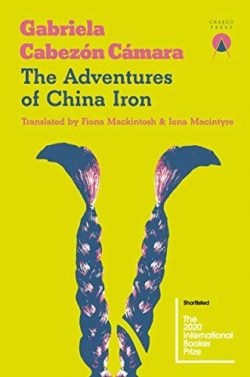In 1872, José Hernández published an epic poem, Martín Fierro, the eponymous story of an outlaw Argentine gaucho, or cowboy. The text was canonized over the years, seen as a special window into the nineteenth-century national soul of Argentina. In form and content, Gabriela Cabezón Cámara’s short novel, Las aventuras de la China Iron – originally published in 2017, translated into English in 2019, and shortlisted for the International Booker Prize the same year – is a radically subversive encounter with Martín Fierro. Cabezón, born in Buenos Aires in 1968, has several acclaimed novels under her belt, and was a founding member of the feminist collective Ni Una Menos.
Cabezón transformed the original epic into parallel coming-of-age stories, on the one hand, the story of the protagonist, China Iron, and, on the other, of Argentina itself. Rich in foundational violence, these personal and national trajectories figuratively map a mental and historical terrain of race and empire, of labour and nature, of sexuality and gender, and of utopian possibilities, just as China and a growing band of misfits literally traverse the pampas in a horse-drawn wagon, heading south toward the Patagonian desert, or Indian Territory. An exhaustive inventory of the region’s flora and fauna, akin to the details of a naturalist’s notebooks, accumulates as the narrative winds on. In interviews, Cabezón has remarked that such indexing helps to mark, by way of implicit juxtaposition, the devastation wrought on the pampas in the interim by agro-industrial soy expansion.
In the Hernández poem, Fierro’s young wife makes but a fleeting appearance. In The Adventures, by contrast, Cabezón gives her the name China Iron and moves her centre stage. Fierro, meanwhile, recedes quickly to the background, returning only toward the end of the novel in utterly metamorphosed form.
It isn’t until a third of the way into the tale that fragmented elements of China’s past begin to assume some semblance of coherence. Misogynist terror informs every early turn of this origin story. Orphaned as an infant, she was seemingly placed in a trunk by the door of the hut of an impoverished couple – La Negra and El Negro – who end up taking her in and putting her to work. She was whipped daily by La Negra and sexually abused by El Negro. The two went hand in hand: “I think La Negra started punishing me for that, when El Negro started to paw at me; she did it out of jealousy – even animals get jealous.”
“La Negra would laugh at me,” China narrates, “saying that my mother must be one of those foreign women who ended up working as whores for the estancia [landed estate] bosses …. I thought about the whole boss’s whore thing. It had never occurred to me: I might be a boss’s daughter.” As a racially ambiguous figure throughout, this paternal trace might explain the later reveal that China’s hair is blonde.
China’s first love is Raúl, “a half-Indian boy,” who is also an orphan. El Negro, by this time too old to stand up to Rául, nonetheless feels “cheated of his property,” and drunkenly bets China at a card came in a run-down tavern, losing to none other than Martín Fierro. A segment from the opening passages of the novel now comes into sharper relief: “I was handed over to the gaucho-singer Martín Fierro in holy matrimony…mere slip of a girl that I was. He wanted to have divine permission, a sacrament so he could throw himself on top of me with God’s blessing. And Fierro did throw himself on top of me, by the time I turned fourteen I’d already given him two boys.”
Fierro, we learn, had never looked in a mirror. In a recurring motif of the blurred racial identities of gauchos in the Argentine context, Fierro is outraged by the indigenous features he sees in China’s first-born child. Believing Raúl to have been the father, Fierro strikes him dead – Raúl is found “with his head split in two like a canyon. He must have been drinking and fallen over, people said. We all knew that wasn’t true. Raúl didn’t drink.” “Fierro killed my Rául,” China explains, “but I think he didn’t kill me because I was the only blonde china he’d touched in his life and I was his; that set him apart from the other men, because I was a trophy worthy of a landowner.” As it turns out, Fierro was wrong about the child’s genetic lineage. “The boy, like Fierro, has moles that form a star in his groin.”
Here we get a sense of the enigmatic play of china/China, which is at once the name of the narrator and something more generic. “‘China’ posed a particular problem,” the translators note in an afterword, “since the word variously means girl, woman, wife or servant, carrying strong racial and class connotations, yet it is also (when capitalised) the name of the heroine herself, despite it not really being an individual name.” Early on, the narrator is asked her name, and is met with disbelief when she responds, “La China.” But she insists, “that’s what La Negra used to shout at me,” and that’s what her husband Fierro would “call me last thing at night as he dropped off to sleep, ‘safe and sound in the arms of love’ as he put it later in one of his songs. He also shouted China when he wanted his food or his trousers or mate to drink or anything else. I was La China.” She is told in response, that where she was from, “all women were called china but they each had their own name as well.”
Shortly after Fierro is introduced, he, like many gauchos, is conscripted by the Argentine army to wage warfare on the indigenous frontier – glimpses of Argentina’s genocidal history. As the wagon makes its way across the pampas, the travellers come upon field after field of indigenous dead: “It poured with rain and the water swept away the merciful dust: all was mud and protruding bones. White bones, pearly and iridescent like a devil’s lantern, the morbid light of dead men’s bones, of mortal remains, of skeletons.” After Fierro departs the scene, the 14-year-old China leaves her “kids in the care of two kindly old folk who would call them by their names, which is more than I ever got.” Thus begins the coming-of-age tale of an adolescent mother of two.
Liz is the second figure of import in the novel. Of her origins, “we knew less, only the little she told us: unlike me, she did have a father and mother, Scottish farmers, both redheads like her.” It is through Liz that the novel opens onto the expanses of the British Empire, and imperial relations with Argentina, in particular, over the nineteenth century. Liz owns the wagon in question, and is en route to find Oscar, her husband, who, like Fierro, had been conscripted.
It is also via Liz that China discovers an expansive sexuality and progressively more mutable gender identity. Apart from a passing early encounter with Raúl, this is the first scene where sex is tied to desire rather than violence:
I got into the wagon. I took off my dress and the petticoats and I put on the Englishman’s breeches and shirt. I put on his neckerchief and asked Liz to take the scissors and cut my hair short. My plait fell to the ground and there I was, a young lad. Good boy she said to me, then pulled my face towards her and kissed me on the mouth. It surprised me, I didn’t understand, I didn’t know you could do that and it was revealed to me so naturally: why wouldn’t you be able to do that? It’s just that back where I came from women didn’t kiss each other, though I did remember cows sometimes mounting other cows. I liked it, Liz’s imperious tongue entered my mouth, her spicy, flowery saliva tasted like curry and tea and lavender water.
With time, China gains confidence, and such scenes grow in mutual intensity; but Liz remains in control: “even before the first rays of sun came into the bedroom I’d woken up practically drowning with Liz’s cunt in my mouth and her rubbing herself against my face, my breathing syncopated with her secretions, she made me breathe in and out to her rhythm as if she were breaking me in. That was what she was doing whether I realised it or not, how better to tame an animal than by forcing it to breathe when you choose.”
Later, in the midst of a raucous ranch party, peopled with farmhands and estancia servants, China’s discovery goes further: “I also felt a curious new happiness in my body: I had kissed a few girls and the gaucho they’d called a faggot. I was definitely getting a taste for them, kisses from girls and gay gauchos.” Still later, she comes to see herself as two-spirited. Chapter titles like “I Climaxed Too,” “Tangled Legs,” and “As If the Milky Way Began or Ended Right There in Her Hands,” speak to the novel’s through line of sexual liberation and the vicissitudes of gender.
Just as the violent parochialism of China’s childhood is broken up by the expanding horizons of the road trip, the apparently sealed-off dynamics of Argentine state-building and nation-forming are revealingly linked to global expansionary waves of industrial capitalism under British dominion, on one side, and violent encroachment into Indian Territory, on the other. “Fierro used to say that the caranchos had to eat too,” China remembers at one point, “and I tend to think he was right about that, although he didn’t take into consideration the huge number of carcasses that our country produced, and not just dead cows; Indian and gaucho corpses also fed several generations of scavenger birds.”
This perspectival complexity, a dialectic of the high and low, is most often dealt with in Liz’s meandering stories from atop the wagon. “‘Only here in the pampa could a wagon create a bird’s eye view’, observed Liz and so I found out what perspective was…. From up high or from down low the world looked different.” From the Queen to the cowboy, China, “began to see other perspectives: the Queen of England – a rich, powerful woman who owned millions of people’s lives… didn’t see the world in the same way as, for example, a gaucho in his hovel with his leather hides who burns dung to keep them warm. For the Queen, the world was a sphere filled with riches belonging to her, and that she could order to be extracted from anywhere; for the gaucho the world was a flat surface where you galloped about rounding up cows, cutting the throats of your enemies before they cut your own throat, or fleeing conscription and battles.”





